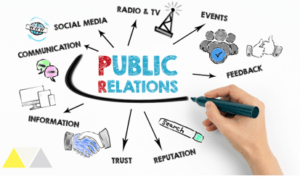By Samuel OWUSU ADUOMI
In today’s fast-evolving business landscape, Public Relations (PR) is no longer a peripheral function—it is a strategic necessity. Organisations across industries are realising that effective PR is not just about media relations or damage control; it is a fundamental driver of business growth, market positioning and long-term sustainability.
Despite this growing importance, many companies still relegate PR to a secondary role, often reporting to marketing or communications teams rather than having direct representation at the highest decision-making levels.
This outdated approach undermines the immense strategic value that PR professionals bring to organisations. To maximise their potential, modern businesses must integrate PR leadership into the C-suite, ensuring that the PR manager or Chief Communications Officer (CCO) has a seat at the executive table.
This article explores the key significance of public relations to organisations, why the PR manager should be an integral part of the C-suite, and the tangible benefits of this strategic positioning. We will examine how PR influences return on investment (ROI), contributes to meeting key performance indicators (KPIs) and aligns with global best practices that drive success and growth.
The strategic importance of public relations in organisations
Public Relations (PR) has evolved far beyond its traditional role of media outreach and crisis management. In today’s interconnected, digital-first world, PR is a core business function that shapes an organisation’s reputation, strengthens stakeholder relationships and directly influences financial performance. The strategic importance of PR cannot be overstated, as it plays a critical role in brand positioning, public perception and long-term corporate success.
- Reputation management as a business asset
A company’s reputation is one of its most valuable intangible assets. A positive public image can attract investors, retain customers and enhance employee morale, while a damaged reputation can have devastating financial and operational consequences.
PR professionals work proactively to manage public perception, ensuring that an organisation is viewed positively by its target audiences. They craft messaging, manage media narratives and develop crisis communication plans to protect and enhance the company’s reputation in the face of challenges.
- Stakeholder engagement and relationship building
Successful organisations thrive on strong relationships with their stakeholders, including customers, employees, investors, regulatory bodies and the media. PR professionals serve as the bridge between the organisation and these key groups, fostering trust, transparency and two-way communication. Through strategic messaging, corporate social responsibility (CSR) initiatives and thought leadership campaigns, PR strengthens stakeholder confidence, leading to increased loyalty and long-term support.
- Crisis management and risk mitigation
In an era where social media can escalate a crisis within minutes, organisations must be prepared to respond swiftly and effectively to reputational threats. PR teams develop crisis communication strategies that enable organisations to maintain control of the narrative, minimise reputational damage and restore public trust. Without a strong PR function embedded in leadership, companies risk making reactive, inconsistent or damaging responses in critical moments.
- Enhancing brand visibility and market positioning
PR plays a significant role in shaping how a brand is perceived in the marketplace. By securing media coverage, leveraging digital PR strategies and positioning executives as industry thought leaders, PR enhances brand visibility and credibility.
A well-positioned brand attracts customers, differentiates itself from competitors and gains a competitive edge. Unlike traditional marketing, which is often viewed as promotional, PR builds organic credibility that strengthens brand loyalty and trust.
- Supporting business goals and revenue growth
PR is directly linked to an organisation’s bottom line. A strong corporate reputation can lead to increased sales, higher stock valuations and greater investor confidence. PR campaigns that highlight corporate innovation, ethical business practices and community engagement enhance consumer trust and drive purchasing decisions. Additionally, PR efforts can support sales teams by reinforcing key messages and shaping public opinion in favour of the company’s products and services.
- Aligning with corporate strategy for long-term success
For PR to be truly effective, it must be aligned with an organisation’s overall business strategy. Companies that integrate PR into their strategic planning benefit from a cohesive, well-managed brand image that resonates with stakeholders.
Whether it’s managing public perception during mergers and acquisitions, supporting employee engagement initiatives or guiding corporate social responsibility efforts, PR is a critical function that contributes to long-term success.
Given the undeniable impact of PR on reputation, stakeholder trust, crisis management and financial growth, it is clear that PR professionals should not be confined to a supporting role within an organisation. Instead, they must be positioned at the highest level of decision-making—the C-suite—where they can contribute to business strategy, anticipate reputational risks and drive long-term value.
Public Relations and ROI: Measuring Impact on Business Success
One of the biggest misconceptions about Public Relations (PR) is that its impact is difficult to quantify. Traditionally seen as a ‘soft’ function, PR has often been overlooked in boardroom discussions centred on revenue generation and financial performance.
However, in today’s data-driven business environment, PR professionals have the tools and methodologies to measure their contributions to an organisation’s bottom line. When strategically executed, PR delivers a strong return on investment (ROI) by enhancing brand equity, increasing stakeholder trust and ultimately driving business success.
- PR’s direct contribution to revenue growth
While PR is not a direct sales function, its influence on revenue generation is undeniable. A well-managed reputation attracts customers, increases brand credibility, and fosters consumer trust—all of which drive purchasing decisions. Positive media coverage, thought leadership campaigns and influencer partnerships amplify brand awareness, making it easier for sales and marketing teams to convert leads into paying customers.
Moreover, PR efforts often lead to increased organic traffic, higher search engine rankings and improved conversion rates. A brand that frequently appears in the media or generates buzz through storytelling has a stronger presence in the minds of consumers, leading to higher engagement and sales.
- Cost-effective brand awareness compared to paid advertising
Unlike paid advertising, where companies must continually invest money to sustain visibility, PR generates organic exposure through earned media, social media engagement and word of mouth. While securing media coverage requires effort and strategy, the long-term benefits far outweigh the costs. Earned media provides third-party validation, making it more credible and influential than traditional advertisements.
Research shows that consumers are more likely to trust editorial content and recommendations from influencers than direct advertising messages. By leveraging PR to secure media placements, companies achieve broader reach and credibility without the continuous costs associated with paid marketing campaigns.
- Reputation and crisis management: Protecting financial stability
A single crisis can cost companies millions in lost revenue, declining stock prices and legal expenses. Effective PR acts as a safeguard against such risks by preparing crisis communication strategies that minimise damage and restore trust. Organisations that handle crises transparently and proactively often recover more quickly than those that react poorly or fail to address stakeholder concerns.
For instance, companies that communicate openly during product recalls, leadership scandals or cyber-security breaches tend to maintain higher customer retention rates than those that remain silent or issue generic statements. A well-managed crisis response can even enhance a company’s reputation, demonstrating accountability and responsibility.

- Employee advocacy and talent acquisition
A strong PR strategy not only benefits external stakeholders but also enhances internal reputation. Companies with a positive public image attract top talent, improve employee retention and foster a culture of pride and loyalty. PR efforts that highlight corporate values, diversity and inclusion initiatives and employee success stories contribute to a strong employer brand.
Organisations known for ethical leadership and corporate responsibility have a competitive advantage in hiring skilled professionals. Additionally, engaged employees become brand ambassadors, amplifying positive messaging through their personal networks and social media channels.
- Data-driven PR: Tracking KPIs for measurable impact
To demonstrate ROI, modern PR teams rely on data analytics and performance tracking. Key performance indicators (KPIs) help measure PR’s impact on business success, including:
- Media impressions & share of voice – Tracking the number of mentions in top-tier media and comparing the brand’s visibility to competitors.
- Website traffic & lead generation – Analysing referral traffic from PR campaigns and media coverage to assess lead conversion rates.
- Brand sentiment analysis – Using AI-driven tools to gauge public perception and sentiment toward the company.
- Customer engagement metrics – Monitoring social media interactions, brand mentions and consumer feedback.
- Stock performance & investor confidence – Evaluating how corporate communications impact investor sentiment and market valuation.
- Long-term value creation through strategic PR
The ROI of PR is not just about short-term sales spikes—it is about long-term value creation. Organisations that invest in strategic PR enjoy sustained brand loyalty, competitive market positioning and resilience during crises. In contrast, companies that neglect PR often struggle with reputation challenges that can erode customer trust and market share.
By integrating PR into executive decision-making, businesses can align communication strategies with overarching corporate goals, ensuring that brand messaging remains consistent, impactful and ROI-driven.
……………to be continued










